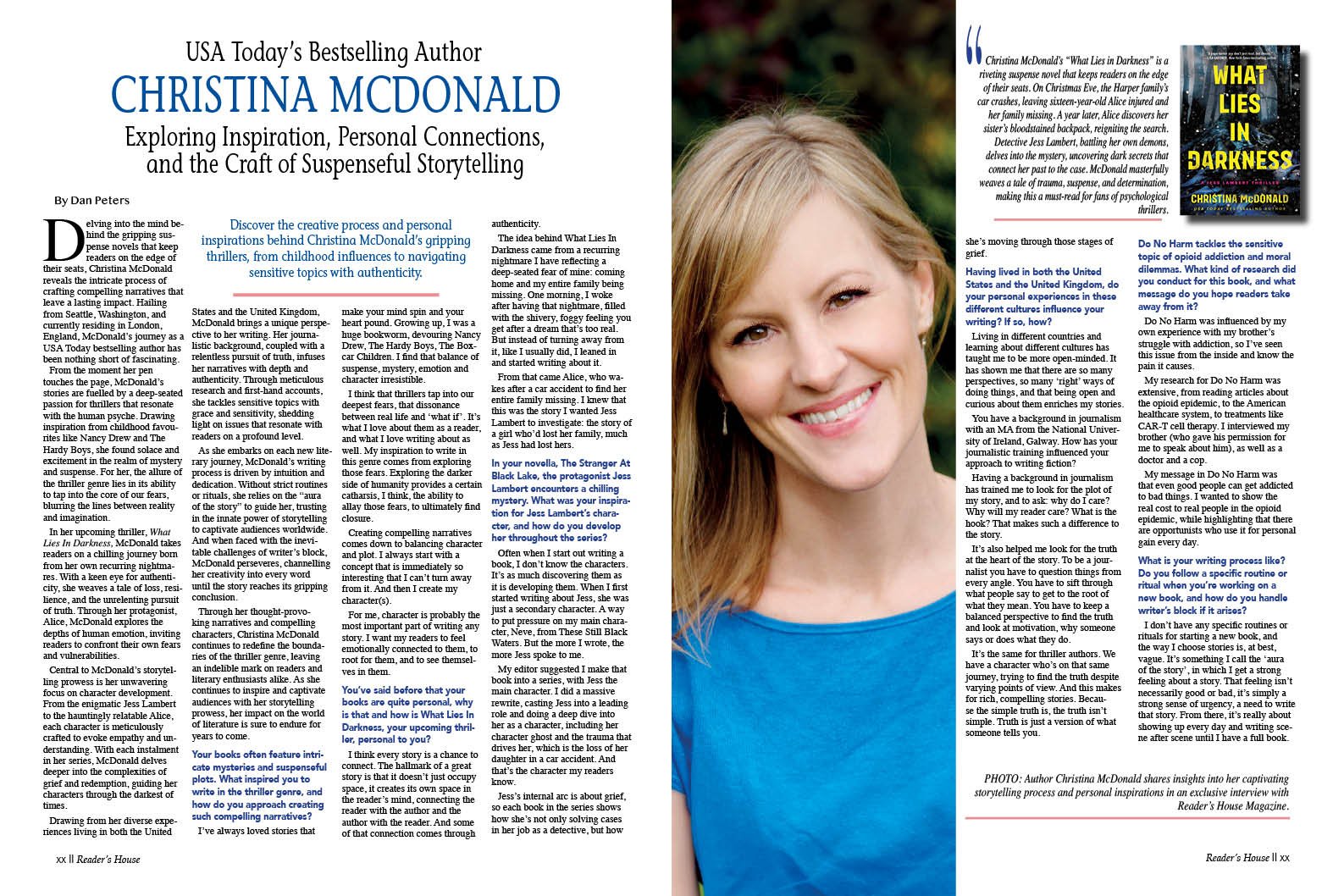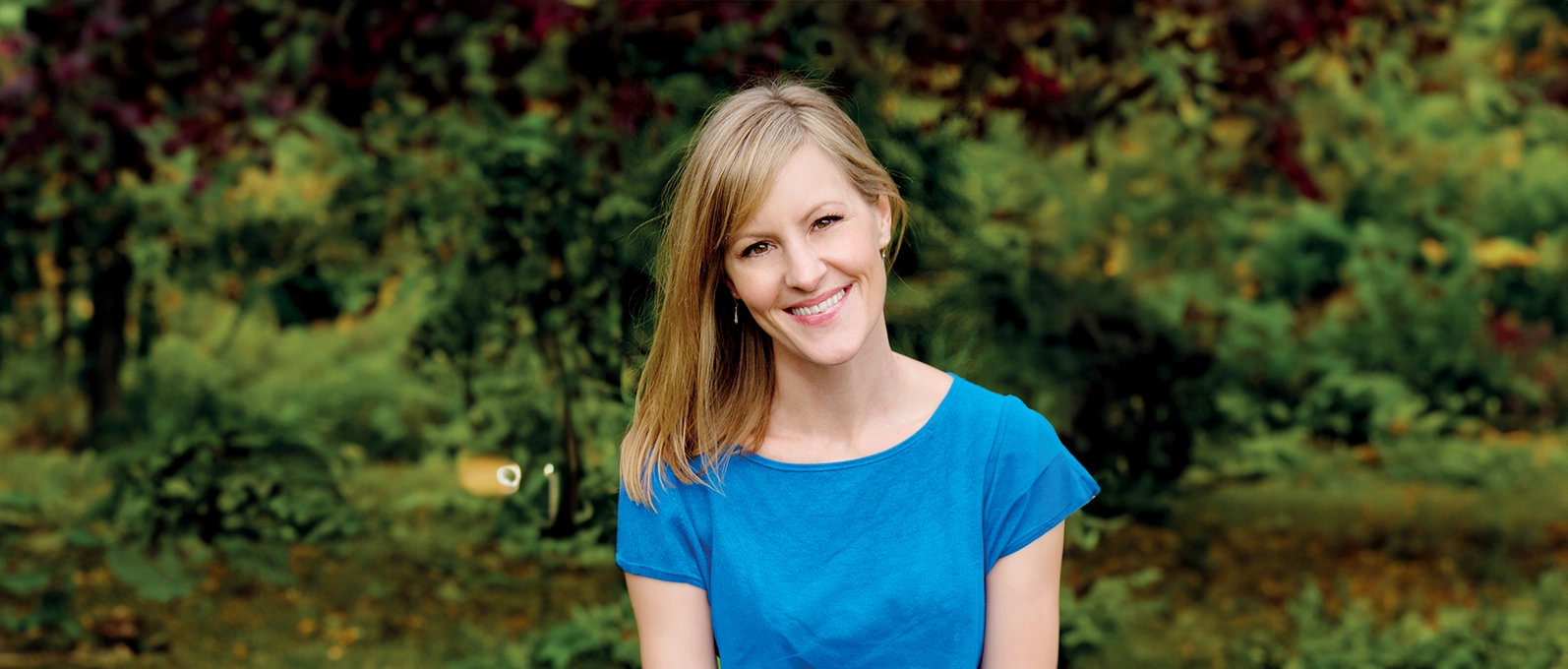Exploring Inspiration, Personal Connections, and the Craft of Suspenseful Storytelling
Discover the creative process and personal inspirations behind Christina McDonald’s gripping thrillers, from childhood influences to navigating sensitive topics with authenticity.
Delving into the mind behind the gripping suspense novels that keep readers on the edge of their seats, Christina McDonald reveals the intricate process of crafting compelling narratives that leave a lasting impact. Hailing from Seattle, Washington, and currently residing in London, England, McDonald’s journey as a USA Today bestselling author has been nothing short of fascinating.
From the moment her pen touches the page, McDonald’s stories are fuelled by a deep-seated passion for thrillers that resonate with the human psyche. Drawing inspiration from childhood favourites like Nancy Drew and The Hardy Boys, she found solace and excitement in the realm of mystery and suspense. For her, the allure of the thriller genre lies in its ability to tap into the core of our fears, blurring the lines between reality and imagination.
In her upcoming thriller, What Lies In Darkness, McDonald takes readers on a chilling journey born from her own recurring nightmares. With a keen eye for authenticity, she weaves a tale of loss, resilience, and the unrelenting pursuit of truth. Through her protagonist, Alice, McDonald explores the depths of human emotion, inviting readers to confront their own fears and vulnerabilities.
Central to McDonald’s storytelling prowess is her unwavering focus on character development. From the enigmatic Jess Lambert to the hauntingly relatable Alice, each character is meticulously crafted to evoke empathy and understanding. With each instalment in her series, McDonald delves deeper into the complexities of grief and redemption, guiding her characters through the darkest of times.
Drawing from her diverse experiences living in both the United States and the United Kingdom, McDonald brings a unique perspective to her writing. Her journalistic background, coupled with a relentless pursuit of truth, infuses her narratives with depth and authenticity. Through meticulous research and first-hand accounts, she tackles sensitive topics with grace and sensitivity, shedding light on issues that resonate with readers on a profound level.
As she embarks on each new literary journey, McDonald’s writing process is driven by intuition and dedication. Without strict routines or rituals, she relies on the “aura of the story” to guide her, trusting in the innate power of storytelling to captivate audiences worldwide. And when faced with the inevitable challenges of writer’s block, McDonald perseveres, channelling her creativity into every word until the story reaches its gripping conclusion.
Through her thought-provoking narratives and compelling characters, Christina McDonald continues to redefine the boundaries of the thriller genre, leaving an indelible mark on readers and literary enthusiasts alike. As she continues to inspire and captivate audiences with her storytelling prowess, her impact on the world of literature is sure to endure for years to come.
Your books often feature intricate mysteries and suspenseful plots. What inspired you to write in the thriller genre, and how do you approach creating such compelling narratives?
I’ve always loved stories that make your mind spin and your heart pound. Growing up, I was a huge bookworm, devouring Nancy Drew, The Hardy Boys, The Boxcar Children. I find that balance of suspense, mystery, emotion and character irresistible.
I think that thrillers tap into our deepest fears, that dissonance between real life and ‘what if’. It’s what I love about them as a reader, and what I love writing about as well. My inspiration to write in this genre comes from exploring those fears. Exploring the darker side of humanity provides a certain catharsis, I think, the ability to allay those fears, to ultimately find closure.
Creating compelling narratives comes down to balancing character and plot. I always start with a concept that is immediately so interesting that I can’t turn away from it. And then I create my character(s).
For me, character is probably the most important part of writing any story. I want my readers to feel emotionally connected to them, to root for them, and to see themselves in them.
You’ve said before that your books are quite personal, why is that and how is What Lies In Darkness, your upcoming thriller, personal to you?
I think every story is a chance to connect. The hallmark of a great story is that it doesn’t just occupy space, it creates its own space in the reader’s mind, connecting the reader with the author and the author with the reader. And some of that connection comes through authenticity.
The idea behind What Lies In Darkness came from a recurring nightmare I have reflecting a deep-seated fear of mine: coming home and my entire family being missing. One morning, I woke after having that nightmare, filled with the shivery, foggy feeling you get after a dream that’s too real. But instead of turning away from it, like I usually did, I leaned in and started writing about it.
From that came Alice, who wakes after a car accident to find her entire family missing. I knew that this was the story I wanted Jess Lambert to investigate: the story of a girl who’d lost her family, much as Jess had lost hers.
In your novella, The Stranger At Black Lake, the protagonist Jess Lambert encounters a chilling mystery. What was your inspiration for Jess Lambert’s character, and how do you develop her throughout the series?
Often when I start out writing a book, I don’t know the characters. It’s as much discovering them as it is developing them. When I first started writing about Jess, she was just a secondary character. A way to put pressure on my main character, Neve, from These Still Black Waters. But the more I wrote, the more Jess spoke to me.
My editor suggested I make that book into a series, with Jess the main character. I did a massive rewrite, casting Jess into a leading role and doing a deep dive into her as a character, including her character ghost and the trauma that drives her, which is the loss of her daughter in a car accident. And that’s the character my readers know.
Jess’s internal arc is about grief, so each book in the series shows how she’s not only solving cases in her job as a detective, but how she’s moving through those stages of grief.
Having lived in both the United States and the United Kingdom, do your personal experiences in these different cultures influence your writing? If so, how?
Living in different countries and learning about different cultures has taught me to be more open-minded. It has shown me that there are so many perspectives, so many ‘right’ ways of doing things, and that being open and curious about them enriches my stories.
You have a background in journalism with an MA from the National University of Ireland, Galway. How has your journalistic training influenced your approach to writing fiction?
Having a background in journalism has trained me to look for the plot of my story, and to ask: why do I care? Why will my reader care? What is the hook? That makes such a difference to the story.
It’s also helped me look for the truth at the heart of the story. To be a journalist you have to question things from every angle. You have to sift through what people say to get to the root of what they mean. You have to keep a balanced perspective to find the truth and look at motivation, why someone says or does what they do.
It’s the same for thriller authors. We have a character who’s on that same journey, trying to find the truth despite varying points of view. And this makes for rich, compelling stories. Because the simple truth is, the truth isn’t simple. Truth is just a version of what someone tells you.
Do No Harm tackles the sensitive topic of opioid addiction and moral dilemmas. What kind of research did you conduct for this book, and what message do you hope readers take away from it?
Do No Harm was influenced by my own experience with my brother’s struggle with addiction, so I’ve seen this issue from the inside and know the pain it causes.
My research for Do No Harm was extensive, from reading articles about the opioid epidemic, to the American healthcare system, to treatments like CAR-T cell therapy. I interviewed my brother (who gave his permission for me to speak about him), as well as a doctor and a cop.
My message in Do No Harm was that even good people can get addicted to bad things. I wanted to show the real cost to real people in the opioid epidemic, while highlighting that there are opportunists who use it for personal gain every day.
What is your writing process like? Do you follow a specific routine or ritual when you’re working on a new book, and how do you handle writer’s block if it arises?
I don’t have any specific routines or rituals for starting a new book, and the way I choose stories is, at best, vague. It’s something I call the ‘aura of the story’, in which I get a strong feeling about a story. That feeling isn’t necessarily good or bad, it’s simply a strong sense of urgency, a need to write that story. From there, it’s really about showing up every day and writing scene after scene until I have a full book.
Folow the Author
- Website: https://christina-mcdonald.com/
- Instagram & Twitter: @christinamac79
- Facebook & TikTok: @christinamcdonaldauthor
- Goodreads: https://www.goodreads.com/author/show/5390380.Christina_McDonald
- Amazon US: https://www.amazon.com/stores/Christina-McDonald/author/B01N4VVC03
- Amazon UK: https://www.amazon.co.uk/stores/Christina-McDonald/author/B01N4VVC03



